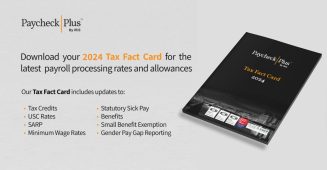
Holiday Entitlements
Holiday Entitlements
As the summer holidays approach, employers need to have a clear understanding of their obligations under the Organisation of Working Time Act 1997 which governs holiday entitlements. This article outlines the holiday entitlements for employees and the calculation of their holiday entitlement for payment.
Holiday Entitlements
There is no qualifying period for holiday entitlements and all employees’, regardless of status, service or age, qualify for paid holiday entitlement. When calculating holiday entitlement, all time worked qualifies for paid holiday time, including overtime hours worked.
How to calculate Holiday Entitlements
Since the 1st April 1999, depending on the time worked, an employee’s minimum holiday entitlement s should be calculated by one of the following methods;
- A minimum of 4 working weeks in a leave year in which the employee works at least 1,365 hours (unless it is a leave year in which he or she changes employment). For an employee who works a 5 day week, this is equal to 20 days paid holiday in a year. An employee who works a 3 day week is also entitled to 4 weeks holidays, but this amounts to 12 working days (4 weeks x 3 days per week). While an employee is entitled to a minimum of 4 weeks holidays in a year, there is nothing to prevent an employer from providing an employee with an annual leave entitlement in excess of 4 weeks, but this is purely a matter between the employer and the employee
- 1/12th of the annual holiday entitlement for every calendar month in which the employee works at least 117 hours. For an employee entitled to the minimum entitlement of 20 days annual paid holidays, this is equal to 1 and 2/3 days (20 divided by 12) of paid holidays per month. For an employee entitled to 30 days’ annual paid holidays by virtue of their contract of employment, this is equal to 2 and ½ days (30 days divided by 12) paid holidays per month
- 8% of the hours an employee works in a leave year (but subject to a maximum of 4 weeks)
If more than one of these provisions applies to an employee and the results are not the same, the employee is entitled to whichever result is the more advantageous for him. An employee who works for eight or more months in a leave year is entitled to take two-unbroken weeks’ leave
Can Employees pay more or less that the statutory holiday entitlement?
An employee’s contract can give more than the statutory minimum holidays, e.g. a teacher can receive 3 months, or more, paid holidays in a year. However, any additional holiday entitlements in an employment contract cannot be enforced under the legislation, since this legislation merely specifies the minimum holiday entitlements of an employee.
How much do employers have to pay for a day’s holiday entitlement?
An employee is regarded as having worked on a day of annual leave or on a public holiday, the hours he or she would have worked on that day, if it had been a normal workday. So when calculating hours worked, credit must be given for the normal hours, which would have been worked on a day of annual leave or a public holiday, if that day had been a normal working day.
What is the holiday entitlement for a part time employee?
Part-time employee’s annual leave entitlement is calculated in a similar manner as a full-time employee based on whichever of the above 3 methods is appropriate depending on the number of hours worked by the part-time employee. This provision has not been altered by the terms of the Protection of Employees (Part-time Work) Act 2001.
In practice, what this means is that an employee who works regular part-time hours. E.g. 7 hours per day, 3 days a week, will be entitled to a minimum of 12 days (3 days x 4 weeks) annual leave per year under the Act. On first glance it may appear that the holiday entitlement should be calculated as 8% of the hours worked, as this employee will not exceed 117 hours per month or 1,365 hours per year, but the 8% calculation is subject to a maximum of 4 working weeks per year. If the employee was to commence or leave mid-year, the annual leave calculation may need to be calculated based on the 8% of the hours worked in the year of commencement or cessation.
If the hours are irregular, how do I work out the holiday entitlements?
Where an employee works irregular hours, their annual leave should be calculated using 8% of hours worked, subject to a maximum of 4 working weeks for that employee which can be averaged over a 13 week period.
For more on Holiday Entitlements read:
Paycheck Plus, Your Outsourced Payroll Provider
Paycheck Plus understand that payroll is a complex and time-consuming operation. Keeping up to date with ever evolving legislative changes, ensuring payroll compliance and delivering employee wages accurately and on time takes its toll on a business’ senior resources. As Ireland’s most highly accredited payroll provider, we have been providing outstanding payroll outsourcing services to each of our client’s needs for nearly twenty years. Our award-winning team of payroll experts specialise in all aspects of payroll, including payroll consultancy, payroll audits, payroll reporting, payroll training while our employee assist helpline and online payslip portal can address your employee’s queries and needs.
To ensure payroll accuracy or for more information on our Irish payroll service simply request a callback now or call our payroll bureau on (0)1 905 9400. Alternatively, request a payroll quote here.



